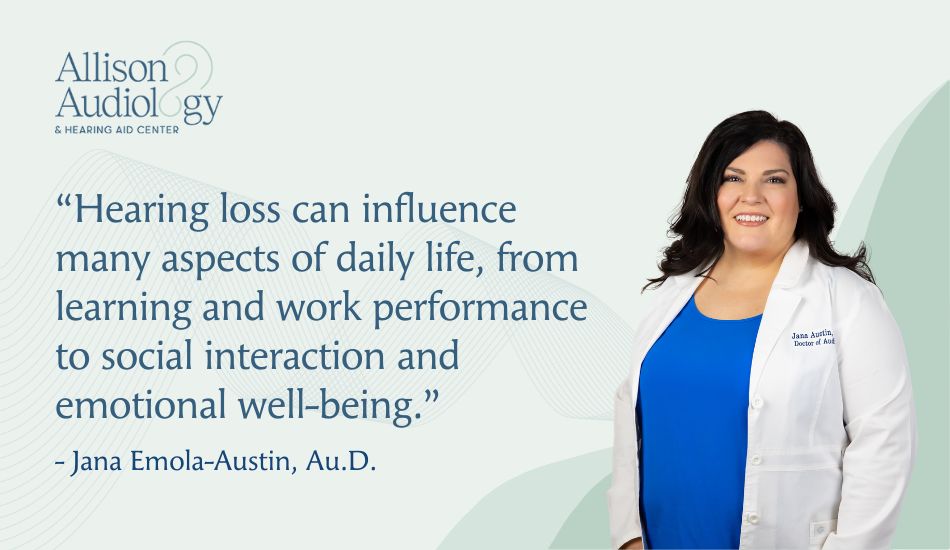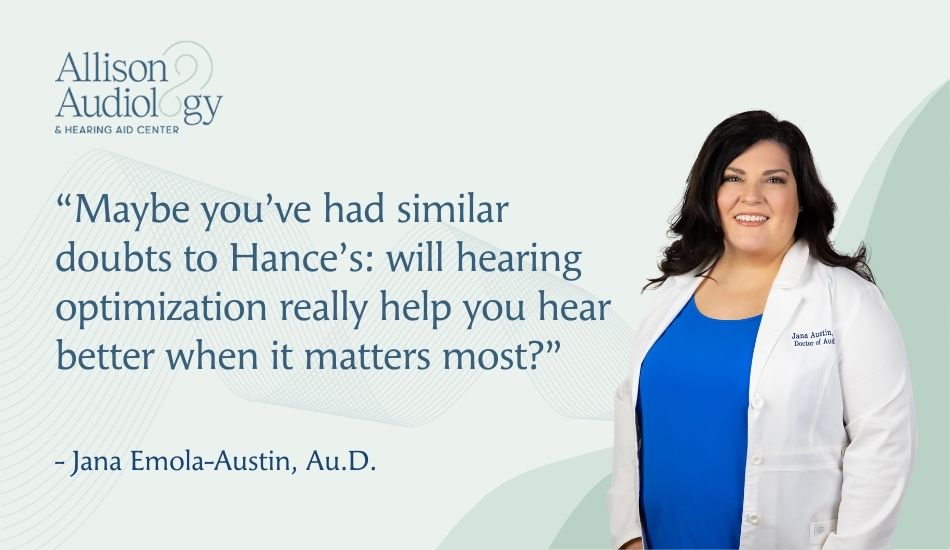
Living with Sound Sensitivities: Coping Strategies for Tinnitus
Tinnitus and sound sensitivity can make everyday noises overwhelming, but personalized care and sound therapy can help.
Living with Sound Sensitivities: Coping Strategies for Tinnitus
Aug 1, 2025
Sound sensitivities can deeply affect your daily life, creating an overwhelming barrier between you and the peaceful environment you seek, especially when combined with tinnitus.
Tinnitus, commonly described as a ringing in the ears, can be triggered by a variety of sounds. You might notice that certain noises exacerbate your symptoms, an indication of a sensitivity to specific sound frequencies.
When managing tinnitus, understanding how sound sensitivities connect to and affect your condition can be pivotal. Remember that support is always available at Allison Audiology, where your well-being is our priority.
Common Symptoms of Tinnitus
Understanding the specific symptoms of tinnitus is essential for identifying and managing the condition effectively. You may encounter the following symptoms:
Ringing or Buzzing Sounds: The most identifiable symptom is hearing a persistent ringing, buzzing, or hissing sound, which others around you do not hear.
Sensitivity to Sound: Often, tinnitus is accompanied by hyperacusis, a heightened sensitivity to everyday sounds that can seem unbearably loud.
Perception Variations: You might find that the sound varies in pitch and intensity, shifting from a low roar to a high squeal throughout the day.
Intermittent vs. Constant: Tinnitus may present intermittently or as a continuous sound, impacting your peace of mind and concentration.
What Sounds Can Trigger Tinnitus?
Addressing both tinnitus and sound sensitivity requires a multi-faceted approach that we specialize in here at Allison Audiology. Our audiologists can provide personalized strategies and treatments tailored to your specific auditory profile.
Some sounds that can trigger tinnitus and sound sensitivities include:
Loud Noises: Exposure to loud environments, like concerts or construction sites, can precipitate tinnitus episodes.
Sudden Sound Exposure: Quick, unexpected sounds, such as sirens or alarms, may initiate or intensify the tinnitus sounds that you experience.
Continuous Background Noise: Persistent noises, like the hum of a refrigerator or air conditioning unit, can sometimes make tinnitus more noticeable due to the contrasting quietness in other frequencies.
Coping Strategies for Daily Life
Managing tinnitus and sound sensitivities begins with understanding your triggers and managing your response to them.
In certain situations, custom hearing protection can be beneficial to lessen the impact of distressing sounds.
A comprehensive hearing assessment can help you understand the full scope of your hearing health, as well as the levels of your tinnitus, and what professional care can do to help you adjust.
Practicing sound desensitization techniques can gradually help you adjust your tolerance to certain sounds. At home or work, set up quiet zones where you can escape and decompress as needed – a space where noise is minimized and peace is prioritized.
The use of white noise machines or calming background sounds, like nature sounds or ambient music, can help create a consistent, soothing auditory backdrop that can override or diminish the impact of trigger sounds. Audiobooks can also be a massive help in distracting tinnitus.
Changing your mind changes your focus: by taking time to indulge in activities that take your mind off of your tinnitus, you can actively work through tinnitus as it comes.
Say for example you’re reading at home and you hear tinnitus. Get up and go take a walk outside—commit to being outdoors for a while, note the colors you see, the scents you smell, other noticeable things that can take your attention away from tinnitus. Sometimes, it’s that simple!
Professional hearing care will provide you with the tools you need in order to manage your responses to tinnitus and sound sensitivity triggers, so that you can hear the life you love without fear. In time, with proper management and expert advice, you’ll be completely habituated to the noise—and the memory of being bothered by it will be a long-gone stressor!
When to Seek Professional Help
If your sound sensitivities are interfering with your ability to engage in daily activities, maintain relationships, or perform at work, it may be time to consult a professional audiologist.
For hearing care in Houston, you can rely on our team to offer tinnitus support and comprehensive treatment personalized to your unique needs.
Sound therapies and counseling are designed to address not just the auditory aspects of these conditions but also the emotional and psychological impacts. Individualized care plans ensure that treatment is tailored to your personal needs and severity of symptoms.
Whether through comprehensive evaluations, customized sound therapies, or ongoing support networks, our services are crafted to provide you with the relief and understanding essential to reclaiming control over your auditory world.
Book a Consultation Today!
With the right strategies and professional support, you can take proactive steps to regain control over your sound environment and enhance your quality of life. Let us help you find your path to enhanced auditory health and well-being.
To get your questions answered, concerns alleviated, or to have a chat with a member of our team, request a callback, and we’ll get in touch as soon as we can.
Don’t want to wait? Give us a call at (713) 804-8097.














